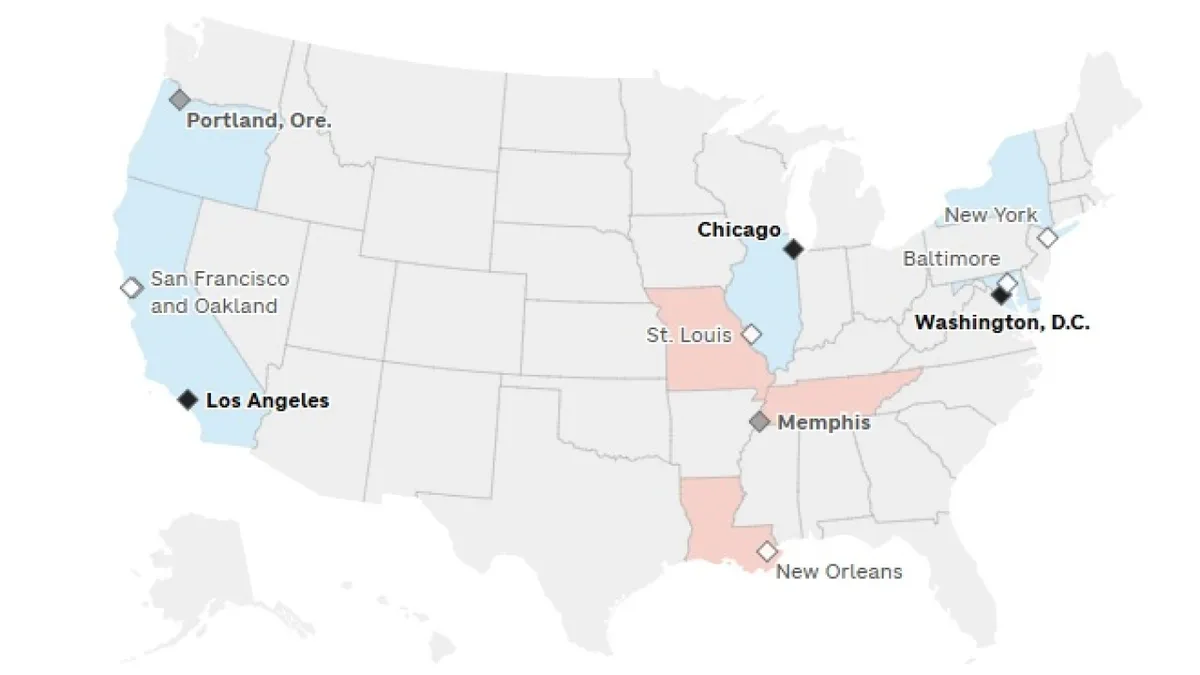
During his second term, President Trump has significantly increased the use of the National Guard across various U.S. cities. In just four months, Trump has either suggested or ordered the deployment of federal troops to nearly a dozen cities, predominantly governed by Democratic mayors and located in states led by Democratic governors. The Trump administration contends that these National Guard forces are essential for combating crime, managing protests, and safeguarding ICE facilities and personnel. However, critics argue that this action represents a dangerous abuse of presidential power. The deployments have sparked numerous legal battles and widespread protests across the nation. Here's what you need to know.
For several weeks, President Trump has threatened to send troops to Chicago, claiming the city requires federal assistance to address rising crime rates. However, Chicago's Democratic Mayor, Brandon Johnson, maintains that crime rates—including homicides, shootings, robberies, and carjackings—are actually declining. The situation intensified on October 4, when Defense Secretary Pete Hegseth mobilized 300 members of the Illinois National Guard to Chicago. Additionally, around 200 members of the Texas National Guard were deployed to the area, according to the U.S. military's Northern Command.
The National Guard troops are primarily assigned to protect ICE facilities and personnel, as well as other federal properties. In response to the federal troop deployment, the state of Illinois and the city of Chicago filed a lawsuit against the Trump administration, arguing that the deployment is unlawful. On the same day, Trump suggested on Truth Social that Illinois Democratic Governor JB Pritzker and Mayor Johnson should be jailed for failing to protect ICE agents. Subsequently, the U.S. Northern Command announced that members of the Texas National Guard had commenced operations to protect ICE and other government personnel in the greater Chicago area. However, on October 5, a federal judge in Chicago temporarily blocked the Trump administration from federalizing and deploying the National Guard in Illinois, with the order expected to last for 14 days. The administration is anticipated to appeal this ruling.
On September 28, the Trump administration activated 200 members of the Oregon National Guard for federal duty, following concerns raised by the Department of Homeland Security regarding protests near an ICE facility in Portland. Trump characterized Portland as 'war-ravaged' and claimed that ICE facilities were under attack by 'domestic terrorists.' However, Oregon Governor Tina Kotek, a Democrat, dismissed these claims as inaccurate, asserting that the city is safe and local law enforcement has the situation under control. In response, the state of Oregon and the city of Portland filed a lawsuit seeking a temporary restraining order to block the troop deployment. U.S. District Judge Karin J. Immergut granted this order, stating that the protests—described as having fewer than 30 participants and largely peaceful—did not justify a military response. The Trump administration later appealed this ruling.
On October 5, California Governor Gavin Newsom announced that the Trump administration was sending the California National Guard to Portland, prompting officials from Oregon and California to challenge the move in court. In a broader response, Judge Immergut issued an order blocking any National Guard deployment to Oregon. A three-judge panel at the U.S. Court of Appeals for the 9th Circuit held a hearing on this matter, but no ruling was made at that time.
On September 15, Trump signed a presidential memorandum to establish a federal task force in Memphis, a move supported by Tennessee Republican Governor Bill Lee. The directive claimed that crime rates in Memphis had reached levels that overwhelmed the local government's capability to respond effectively. However, Memphis Mayor Paul Young, a Democrat, has stated that the city has been making progress in reducing crime following a spike in 2023. This task force involves agents from various federal agencies, as well as the Tennessee National Guard under the governor's command. According to Lee, the troops will serve in support roles rather than making arrests. The task force began operations on September 29, with Memphis Police Chief Cerelyn CJ Davis confirming that some National Guard members were already in the city for planning purposes.
On August 11, Trump dispatched hundreds of National Guard members to Washington, D.C., after declaring a crime emergency in the nation's capital. This action included temporarily taking control of the city's Metropolitan Police Department for about 30 days. This deployment occurred despite city data indicating that violent crime had dropped to a 30-year low the previous year. Over the past two months, National Guard members have been observed patrolling train stations and low-crime areas, as well as participating in beautification efforts such as trash collection and fence painting. As of October 1, around 2,200 National Guard members remain in D.C., with their deployment expected to continue until November 30. The District of Columbia has filed a lawsuit to end the troop deployment, with a court hearing scheduled for October 24.
On June 7, Trump deployed the California National Guard to Los Angeles in response to protests regarding immigration raids, some of which escalated into clashes with local police. In total, around 4,000 guard troops and 700 Marines were deployed, with the Pentagon beginning to withdraw troops in mid-July. This deployment has resulted in a legal battle, with the state of California accusing the Trump administration of exceeding its legal authority by deploying troops without the governor's consent. Currently, about 100 guard members remain in California for federal service according to the U.S. Northern Command.
In recent months, President Trump has indicated potential deployments to additional cities, including New Orleans, New York City, Baltimore, San Francisco, Oakland, and St. Louis, citing public safety concerns as the driving factor. "We want to save these places," Trump stated on September 15 while announcing the creation of the anti-crime federal task force in Memphis. Some Republican-led states have welcomed this support, with Louisiana's Republican Governor Jeff Landry requesting federal assistance to activate up to 1,000 members of the Louisiana National Guard to combat high crime rates not just in New Orleans, but also in Shreveport and Baton Rouge.